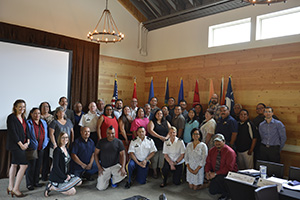Texas Military continues to strengthen partnerships with Native Americans
Story by: Sgt. Elizabeth Peña
Posted: August 9, 2016
 Key leaders from the Texas Military Department and state agencies joined together with representatives from over 15 Native American tribes representing Texas, Oklahoma, Louisiana, and New Mexico, during the annual tribal consultation, July 27, 2016 in Austin, Texas. The Texas Military has been working closely with Native Americans since the 1990’s to review plans that will allow for the preservation and protection of historic lands on Texas military training sites. (U.S. Army National Guard photo by: Sgt. Elizabeth Peña/Released)
Key leaders from the Texas Military Department and state agencies joined together with representatives from over 15 Native American tribes representing Texas, Oklahoma, Louisiana, and New Mexico, during the annual tribal consultation, July 27, 2016 in Austin, Texas. The Texas Military has been working closely with Native Americans since the 1990’s to review plans that will allow for the preservation and protection of historic lands on Texas military training sites. (U.S. Army National Guard photo by: Sgt. Elizabeth Peña/Released)
AUSTIN, Texas – Key leaders from the Texas Military Department and state agencies gathered together at a table with representatives from over 15 Native American tribes representing Texas, Oklahoma, Louisiana, and New Mexico, during the annual tribal consultation, July 27, 2016 in Austin, Texas.
The Texas Military has been working closely with Native Americans since the 1990’s to review plans that will allow for the preservation and protection of historic lands on Texas military training sites.
“The Army made a requirement for the Army installations to reach out to Native American nations,” said Brig. Gen. Tracy R. Norris, assistant deputy adjutant general of the Texas Military Department. “What you see at this last visit is all those years of work, things are really starting to grow now especially with other agencies wanting to come in to meet at the same time to save time for all of the different tribes.”
This year local agencies such as the Texas Department of Transportation, the Texas Historical Commission, the Texas Archaeological Research Lab, and the Texas Parks and Wildlife Department joined the table.
“It is beneficial to our relationship with the tribe because they were pretty excited to be able to visit with TxDot,” said Kristen Mt. Joy, the cultural resources manager for the Texas Military Department. “They are building roads all over the place so there are a lot of issues that the tribes want to know what they're doing, where they're putting those roads and to make sure they're protecting cultural sites.”
The Texas Military Department currently has seven training installations across Texas covering over 30,000 acres of land.
“With us, we have training lands and they are kind of contiguous large pieces of land,” said Mt. Joy. “We go out and we’ve identified all the archeological buried sites at those training facilities, and we look at the things that are most important and, we do that with the tribes.”
For Texas, this was the biggest conference since the program was established.
“As it gets stronger every year, there’s more substance coming in and more collaboration, said Norris.
There are currently only three active tribes in Texas; the Alabama-Coushatta Tribe of Texas in Livingston, the Kickapoo Traditional Tribe of Texas, in Eagle Pass and the Ysleta del Sur Pueblo, in El Paso.
“So those were the only tribes that got to stay here in their ancestral territories, everyone else got relocated,” said Mt. Joy. “It’s an opportunity for them to reconnect with their heritage here in Texas and to know that things are being protected and respected on lands that we manage.”
During military trainings, Texas Guardsmen are given cards to identify plants and wildlife that need to be preserved.
Holly Houghton, of the Tribal Historic Preservation Office says educating Soldiers helps them understand why preserving and protecting historic land is so important to the tribes.
“It's like there’s a cactus, who wants a cactus, it’s got prickers. Well it produces a fruit that we use but also if you roast it and peel it then the flesh inside can be used for wounds or all sorts of different uses. When they realize that plant has something important, well then they won’t just destroy it,” said Houghton.
Meetings like this give the Texas Military Department and Tribal leaders a lasting relationship based on our core values.
“It’s the right thing to do,” said Norris. “It keeps our credibility with the Native Americans in the areas that we train in. They become advocates for us because we take good care of the things they care about.”